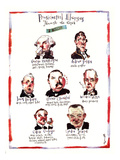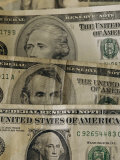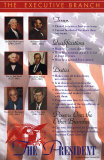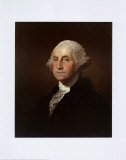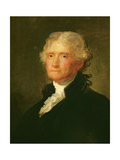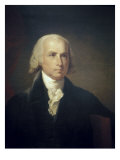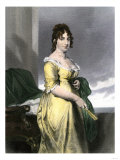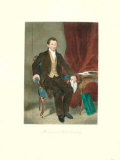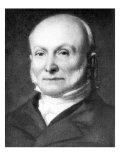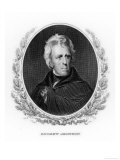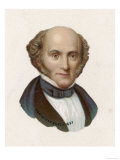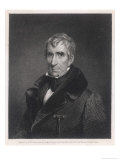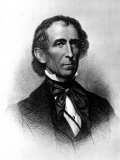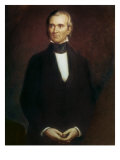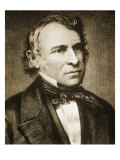|
|
|
|
|
|
|
|
|
A Close View of Denominations of American Paper Money
The law prohibits portraits of living persons from appearing on Government Securities. Therefore, the portraits on currency notes are of deceased persons whose places in history the American people know well. (US Treasury FAQs)
Washington – $1; Jefferson – $2; Lincoln – $5; Hamilton – $10; Jackson – $20; Grant – $50; Franklin – $100.
• more money posters
|
|
|
|
The Executive Branch-
Terms
• Elected to serve a four-year term.
• Cannot be elected for more than two terms.
Qualifications
• Must be 35 years old or older.
• Must be a resident of the U.S. for at least 14 years.
• Must be a natural-born citizen.
Duties
• Make sure all federal laws are enforced.
• Is in charge of protecting the nation and seeing to its defense.
• Directs nation's dealing with other countries and makes treaties with them.
• Proposes new laws to Congress.
• Appoints most of the top officials of the executive branch.
Powers Over Other Branches
• Can veot bills passed by Cognress.
• Appoints federal judges, including Supreme Courts Justices.
Washington, Van Buren, Lincoln, Wilson, FDR, Kennedy.
• political process posters
|
|
|
|
|
|
|
John Adams (F)
(2nd US President, 1797-1801)
b. 10-30-1735; Braintree, MA
d. 7-4-1826, Braintree, MA
John Adams Quotes ~
• “Facts are stubborn things; and whatever may be our wishes, our inclinations, or the dictates of our passion, they cannot alter the state of facts and evidence.” ‘Argument in Defense of the Soldiers in the Boston Massacre Trials,’ December 1770
• “The right of a nation to kill a tyrant in case of necessity can no more be doubted than to hang a robber, or kill a flea.”
• “The United States of America have exhibited, perhaps, the first example of governments erected on the simple principles of nature; and if men are now sufficiently enlightened to disabuse themselves of artifice, imposture, hypocrisy, and superstition, they will consider this event as an era in their history. Although the detail of the formation of the American governments is at present little known or regarded either in Europe or in America, it may hereafter become an object of curiosity. It will never be pretended that any persons employed in that service had interviews with the gods, or were in any degree under the influence of Heaven, more than those at work upon ships or houses, or laboring in merchandise or agriculture; it will forever be acknowledged that these governments were contrived merely by the use of reason and the senses.” ~ A Defence of the Constitutions of Government of the United States of America” 1787-1788
• “The Government of the United States of America is not in any sense founded on the Christian religion.” ~1797 Treaty of Tripoli signed by John Adams
• Thirteen governments [of the original states] thus founded on the natural authority of the people alone, without a pretence of miracle or mystery, and which are destined to spread over the northern part of that whole quarter of the globe, are a great point gained in favor of the rights of mankind.” ~ A Defence of the Constitutions of Government of the United States of America (1787-88)
• “We should begin by setting conscience free. When all men of all religions shall enjoy equal liberty, property, and an equal chance for honors and power we may expect that improvements will be made in the human character and the state of society.” ~ letter to Dr. Price, April 8, 1785
• “The Revolution was effected before the war commenced. The Revolution was in the minds and hearts of the people ... This radical change in the principles, opinions, sentiments, and affections of the people was the real American Revolution.” Letter to H. Niles, February 13, 1818
• “Government is instituted for the common good; for the protection, safety, prosperity, and happiness of the people; and not for profit, honor, or private interest of any one man, family, or class of men.” Thoughts on Government, 1776.
• “Laws for the liberal education of the youth, are so extremely wise and useful, that, to a humane and generous mind, no expense for this purpose would be thought extravagant.”
• Founding Fathers posters
• famous teachers posters
• Abigail Adams posters
|
|
|
|
Thomas Jefferson (D-R)
(3rd US President, 1801-09)
b. 4-13-1743; Albemarle Co., VA
d. 7-4-1826, Monticello, VA
Thomas Jefferson quotes ~
• “I cannot live without books.”
• “The most valuable of all talents is that of never using two words when one will do.”
• “I'm a greater believer in luck, and I find the harder I work the more I have of it.”
• “We in America do not have government by the majority. We have government by the majority who participate.”
• “Information is the currency of democracy.”
• “The purpose of government is to enable the people of a nation to live in safety and happiness. Government exists for the interests of the governed, not for the governors.”
• “I predict future happiness for Americans, if they can prevent the government from wasting the labors of the people under the pretense of taking care of them.”
• “The legitimate powers of government extend to such acts only as are injurious to others. It does me no injury for my neighbor to say there are twenty gods or no god. It neither picks my pocket nor breaks my leg.”
• “Religious institutions that use government power in support of themselves and force their views on persons of other faiths, or of no faith, undermine all our civil rights. Moreover, state support of an established religion tends to make the clergy unresponsive to their own people, and leads to corruption within religion itself. Erecting the ‘wall of separation between church and state,’ therefore, is absolutely essential in a free society.”
• “Nothing gives one person so much advantage over another as to remain always cool and unruffled under all circumstances.”
• “I contemplate with sovereign reverence that act of the whole American people which declared that their legislature should make no law respecting an establishment of religion, or prohibit the free exercise thereof, thus building a wall of separation between church and state.” ~ letter to the Baptists of Danbury, Connecticut, 1802
• “In every country and in every age, the priest has been hostile to liberty. He is always in alliance with the despot, abetting his abuses in return for protection to his own. It is error alone that needs the support of government. Truth can stand by itself.” ~ in a letter to Horatio Spofford, 1814
• “Question with boldness even the existence of a God; because, if there be one, he must more approve of the homage of reason, then that of blindfolded fear.” ~ letter to Peter Carr, August 10, 1787
• “I am for freedom of religion and against all maneuvers to bring about a legal ascendancy of one sect over another.” ~ letter to Elbridge Gerry, January 26, 1799
• “History, I believe, furnishes no example of a priest-ridden people maintaining a free civil government. This marks the lowest grade of ignorance of which their civil as well as religious leaders will always avail themselves for their own purposes.” ~ in letter to Alexander von Humboldt, December 6, 1813
• “Because religious belief, or non-belief, is such an important part of every person’s life, freedom of religion affects every individual.
• State churches that use government power to support themselves and force their views on persons of other faiths undermine all our civil rights. Moreover, state support of the church tends to make the clergy unresponsive to the people and leads to corruption within religion. Erecting the “wall of separation between church and state,” therefore, is absolutely essential in a free society. We have solved … the great and interesting question whether freedom of religion is compatible with order in government and obedience to the laws. And we have experienced the quiet as well as the comfort which results from leaving every one to profess freely and openly those principles of religion which are the inductions of his own reason and the serious convictions of his own inquiries.” ~ in a speech to the Virginia Baptists, 1808
• “Christianity neither is, nor ever was a part of the common law.” ~ letter to Dr. Thomas Cooper, February 10, 1814
• Lewis & Clark posters
• architects posters
• decimal chart - Thomas Jefferson proposed the decimal system for the US currency.
• Sally Hemings
• Thomas Walker
|
|
|
|
James Madison (D-R)
(4th US President, 1809-17)
b. 3-16-1751; Port Conway, King George, VA
d. 6-28-1836; Montpilier, VA
James Madison is called the “Father of the Constitution” and drafted of the Bill of Rights. He was also the primary author of the Federalist Papers , a series of 85 essays published in newspapers explaining to the public how the proposed Constitution would work. , a series of 85 essays published in newspapers explaining to the public how the proposed Constitution would work.
FYI - Madison married Dolley Payne Todd, a widow with a son, in 1793. Dolley Madison is best remembered for saving a portrait of George Washington from burning in the White House during the War of 1812.
Madison was also a second cousin to Zachary Taylor.
James Madison quotes ~
• “Conscience is the most sacred of all property.”
• “The advancement and diffusion of knowledge is the only guardian of true liberty.”
• “The Religion then of every man must be left to the conviction and conscience of every man; and it is the right of every man to exercise it as these may dictate.”
• “The man who is possessed of wealth, who lolls on his sofa or rolls in his carriage, cannot judge the wants or feelings of the day-laborer. The government we mean to erect is intended to last for ages.”
• “Landholders ought to have a share in the government, to support these invaluable interests, and to balance and check the other. They ought to be so constituted as to protect the minority of the opulent against the majority.”
• “A standing military force, with an overgrown Executive will not long be safe companions to liberty. The means of defence against foreign danger have been always the instruments of tyranny at home.”
• “A popular Government without popular information, or the means of acquiring it, is but a Prologue to a Farce or a Tragedy, or perhaps both. Knowledge will forever govern ignorance: And a people who mean to be their own Governors, must arm themselves with the power which knowledge gives.”
• “During almost fifteen centuries has the legal establishment of Christianity been on trial. What have been its fruits? More or less in all places, pride and indolence in the Clergy, ignorance and servility in the laity, in both, superstition, bigotry and persecution.”
• “The accumulation of all powers, Legislative, Executive, and Judiciary, in the same hands, whether of one, a few, or many, and whether hereditary, self-appointed, or elective, may justly be pronounced the very definition of tyranny.”
• “If men were angels, no government would be necessary. If angels were to govern men, neither external nor internal controls on government would be necessary. In framing a government which is to be administered by men over men, the great difficulty lies in this: you must first enable the government to control the governed; and in the next place oblige it to control itself. A dependence on the people is, no doubt, the primary control on the government; but experience has taught mankind the necessity of auxiliary precautions.”
• “Crisis is the rallying cry of the tyrant.”
• “If man is not fit to govern himself, how can he be fit to govern someone else?”
• “The civil government functions with complete success by the total separation of the Church from the State.” ~ 1819, Writings, 8:432, quoted from Gene Garman, “Essays In Addition to America’s Real Religion”
• “And I have no doubt that every new example will succeed, as every past one has done, in shewing that religion & Govt will both exist in greater purity, the less they are mixed together.” ~ letter to Edward Livingston, July 10, 1822
• “Every new and successful example of a perfect separation between ecclesiastical and civil matters is of importance.” ~ letter, 1822
• “Strongly guarded as is the separation between Religion and Government in the Constitution of the United States, the danger of encroachment by Ecclesiastical Bodies, may be illustrated by precedents already furnished in their short history.” ~ Monopolies, Perpetuities, Corporations, Ecclesiastical Endowments
• “Knowledge will forever govern ignorance. And a people who mean to be their own governors, must arm themselves with the power which knowledge give.”
• “The essence of Government is power, and power, lodged as it must be in human hands, will ever be liable to abuse.”
• “To the press alone, chequered as it is with abuses, the world is indebted for all the triumphs which have been gained by reason, and humanity over error and oppression.”
• Marbury v. Madison - Supreme Court Landmark Decisions poster
|
|
|
|
James Monroe (D-R)
(5th US President, 1817-25)
b. 4-28-1758; Westmoreland Co., VA
d. 7-4-1831; NYC, NY (in the home of his daughter, heart failure & tuberculosis)
James Monroe, the last Founding Father to become president, was wounded in the shoulder in the Battle of Trenton. According to Wikipedia Monroe is portraited as the man holding the flag in the famous painting Washington Crossing the Delaware.
The Monroe Doctrine, the policy of the United States states efforts by European countries to colonize land or interfere with states in the Americas would be viewed as acts of aggression requiring U.S. intervention was written by directed Monroe's Secretary of State, John Quincy Adams.
Another important event in US history occurred during Monroe's tenure - the Missouri Compromise (1820) permitting Missouri to enter the Union (1821) as a slave state balanced by Maine as a free state (1820). The other states admitted during Monroe's tenure were Mississippi (1817), Illinois (1818), Alabama (1819).
James Monroe quote ~
• “It is only when the people become ignorant and corrupt, when they degenerate into a populace, that they are incapable of exercising the sovereignty. Usurpation is then an easy attainment, and an usurper soon found. The people themselves become the willing instruments of their own debasement and ruin. Let us, then, look to the great cause, and endeavor to preserve it in full force. Let us by all wise and constitutional measures promote intelligence among the people as the best means of preserving our liberties.” ~ First Inaugural Address, March 4, 1817
FYI ~
• Monroe was the third president to die on July 4 (Adams & Jefferson in 1826).
• Monroe was also a supporter of the African Colonization Society, sending emancipated slaves back to Africa; the city of Monrovia, Liberia is named after Monroe.
|
|
|
|
John Quincy Adams (D-R),
(6th US President, 1825-29)
b. 7-11-1767; Braintree, MA
d. 2-23-1848; after collapsing on the floor of the House 2 days earlier
John Quincy Adams, the son of Abigail and John Adams, 2nd US President, is considered to be one of the great diplomats in American history. He served as Secretary of State for James Monroe, as a Senator from Massachusetts (1803-1808) and as a member of the House of Representatives 1831-1833, 1833-1843, 1843-1848.
Adams, who often spoke out against the the organized political power of southern slave holders, represented the defendants in United States v. The Amistad Africans in the Supreme Court of the United States. He successfully argued that the Africans, who had seized control of a Spanish ship on which they were being transported illegally as slaves, should not be extradited or deported to Cuba (a Spanish colony where slavery was legal) but should be considered free.
|
|
|
|
Andrew Jackson (D-R)
(7th President, 1829-1837)
b. 3-15-1767; Waxhaw, SC
d. 6-8-1845; The Hermitage, TN
Andrew Jackson, a lawyer, politican, and plantation owner, gained fame and the nickname “Old Hickory” as army general who defeated the British at the Battle of New Orleans (1815) and the Creek Indians at the Battle of Horseshoe Bend (1814).
Jackson dominated politics in the 1820s and 1830s, destroying the national bank and forcing most Indian tribes to the west. He is considered a founder of what became the modern Democratic Party and the namesake of Jacksonian democracy.
Controversy over Jackson's frontier marriage to Rachel Donelson caused him great pain and he blamed John Quincey Adams for bringing on the heart attack that killed Rachel in 1828.
FYI - Jackson was orphaned by age 14. His parents, who had immigrated from Ireland in 1765, settled in the border area North and South Carolina called the Washaws. His father, also named Andrew, died just three weeks before he was born, his older brothers died during the Revolutionary War (Hugh, heat exhaustion at Battle of Stono Ferry; Robert, small pox as a POW of the British), his mother Elizabeth contracted cholera while nursing POWs.
|
|
|
|
Martin Van Buren (D)
(8th President, 1837-1841)
b. 12-5-1782; Kinderhook, NY
d. 7-24-1862
Martin Van Buren was the first president not of British ancestry (he was Dutch), the only president for whom English was a second language, and the first president to be born a US citizen.
FYI -
• Van Buren and Jefferson are the only people who served as Secretary of State, Vice President and President.
• Van Buren's campaign slogan - Vote for O.K. - is in reference to his home town - Kinderhook. O.K is easier to say and would was a cleaver tie-in since the phrase OK seems to have been in common colloquial use at the time, based on a misspelling of “all correct”.
|
|
|
|
William Henry Harrison (W)
(9th President, 1841)
b. 2-9-1773; Charles City Co., VA
d. 4-4-1841, Washington, DC
Harrison, whose campaign slogan was “Tippecanoe and Tyler too” referring to the Battle of Tippecanoe, was the oldest president (68) until the election of Ronald Reagan (69).
Harrison had the shortest tenure in the history of the US presidency - “only 30 days, 12 hours and 30 minutes”. Cause of death was “pneumonia, jaundice, septicemia”, the result of giving the longest inaugural address, which he delivered without an overcoat or hat on a cold, wet day.
FYI -
• Harrison's father sent him to learn medicine, which he throughly disliked and was unable to continue when his father died.
• A son of William Henry Harrison and his wife Anna Tuthill Symmes Harrison married the only child, Clarissa, of Zebulon Pike.
|
|
|
|
John Tyler (W)
(10th President, 1841-1845)
b. 3-29-1790; Charles City Co., VA
d. 1-18-1862; Richmond, VA (probably a stroke)
John Tyler, Vice-President to William Henry Harrison, was the first to assume the presidency by succession, which became the custom until the Twenty-fifth Amendment codified in 1967.
Tyler is also considered the only president to die outside the United States because his place of death, Richmond, Virginia, was part of the Confederate States at the time.
FYI -
• The city of Tyler, Texas is named for John Tyler - Texas became a state during his tenure (1845).
• Noted statesman Daniel Webster served as Secretary of State for Harrison and Tyler.
• Tyler is first of only four people to serve as a Represntative, Senator, Vice President, and President (Andrew Johnson, Lyndon Baines Johnson, and Richard M. Nixon.
|
|
|
|
James K. Polk (D)
(11th President, 1845-1849)
b. 11-2-1795; Mecklenburg Co. NC
d. 6-15-1849; Nashville, TN (cholera)
James K. Polk, the last of the Jacksonians, stood for expansion and the Manifest Destiny of the US. Polk was in favor of annexing Texas, popular in the South, and which happened before he took office. He was involved in the boundary question of Oregon but didn't side with the extremists who cry was “Fifty-four forty or fight” for taking the northern border to 54'40', the southern boundary of Russian Alaska. Polk acquired California, Arizona and New Mexico in the Mexican-American War (1846-1848) and purchase.
FYI- Polk promised to serve only one term and did not seek reelection.
|
|
|
|
Zachary Taylor (W)
(12th President, 1849-1850)
“Old Rough & Ready”
b. 11-24-1784; Orange Co., VA, raised in Kentucky
d. 7-9-1850; Washington, DC
Zachary Taylor, whose nickname was “Old Rough and Ready,” had a forty-year military career in the United States Army. He served in the War of 1812, the Black Hawk War, and the Second Seminole War and achieved fame in the Battle of Palo Alto and the Battle of Monterrey during the Mexican–American War.
Taylor's father, Richard, was an officer in the Continental Army, serving under George Washington. Other ancestors include Elder William Brewster, and Taylor was a second cousin to James Madison. He is also related to FDR and Robert E. Lee.
Taylor was the last president to own slaves during his tenure in office. He served only fifteen months; the cause of his death was been ascribed to eating cherries in milk while attending the groundbreaking for the Washington Monument during a July heatwave, to cholera, and the possibility of poisoning.
• Did you know Zachary Taylor's daughter, Sarah Knox Taylor, married Jefferson Davis?
|
|
|
previous page | top | PRESIDENTS 1 /1789-1850 | pg 2 / 1850-1929 | pg 3 / 1933-present
|
|
I have searched the web for visual, text, and manipulative curriculum support materials - teaching posters, art prints, maps, charts, calendars, books and educational toys featuring famous people, places and events - to help teachers optimize their valuable time and budget.
Browsing the subject areas at NetPosterWorks.com is a learning experience where educators can plan context rich environments while comparing prices, special discounts, framing options and shipping from educational resources.
Thank you for starting your search for inspirational, motivational, and educational posters and learning materials at NetPosterWorks.com. If you need help please contact us.
|
|
|















